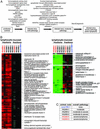Distinct gene expression profiles characterize the histopathological stages of disease in Helicobacter-induced mucosa-associated lymphoid tissue lymphoma
- PMID: 12552104
- PMCID: PMC298766
- DOI: 10.1073/pnas.242741699
Distinct gene expression profiles characterize the histopathological stages of disease in Helicobacter-induced mucosa-associated lymphoid tissue lymphoma
Abstract
Long-term colonization of humans with Helicobacter pylori can cause the development of gastric B cell mucosa-associated lymphoid tissue lymphoma, yet little is known about the sequence of molecular steps that accompany disease progression. We used microarray analysis and laser microdissection to identify gene expression profiles characteristic and predictive of the various histopathological stages in a mouse model of the disease. The initial step in lymphoma development is marked by infiltration of reactive lymphocytes into the stomach and the launching of a mucosal immune response. Our analysis uncovered molecular markers of both of these processes, including genes coding for the immunoglobulins and the small proline-rich protein Sprr 2A. The subsequent step is characterized histologically by the antigen-driven proliferation and aggregation of B cells and the gradual appearance of lymphoepithelial lesions. In tissues of this stage, we observed increased expression of genes previously associated with malignancy, including the laminin receptor-1 and the multidrug-resistance channel MDR-1. Finally, we found that the transition to destructive lymphoepithelial lesions and malignant lymphoma is marked by an increase in transcription of a single gene encoding calgranulin AMrp-8.
Figures




References
Publication types
MeSH terms
Substances
Grants and funding
LinkOut - more resources
Full Text Sources
Other Literature Sources
Medical
Molecular Biology Databases

